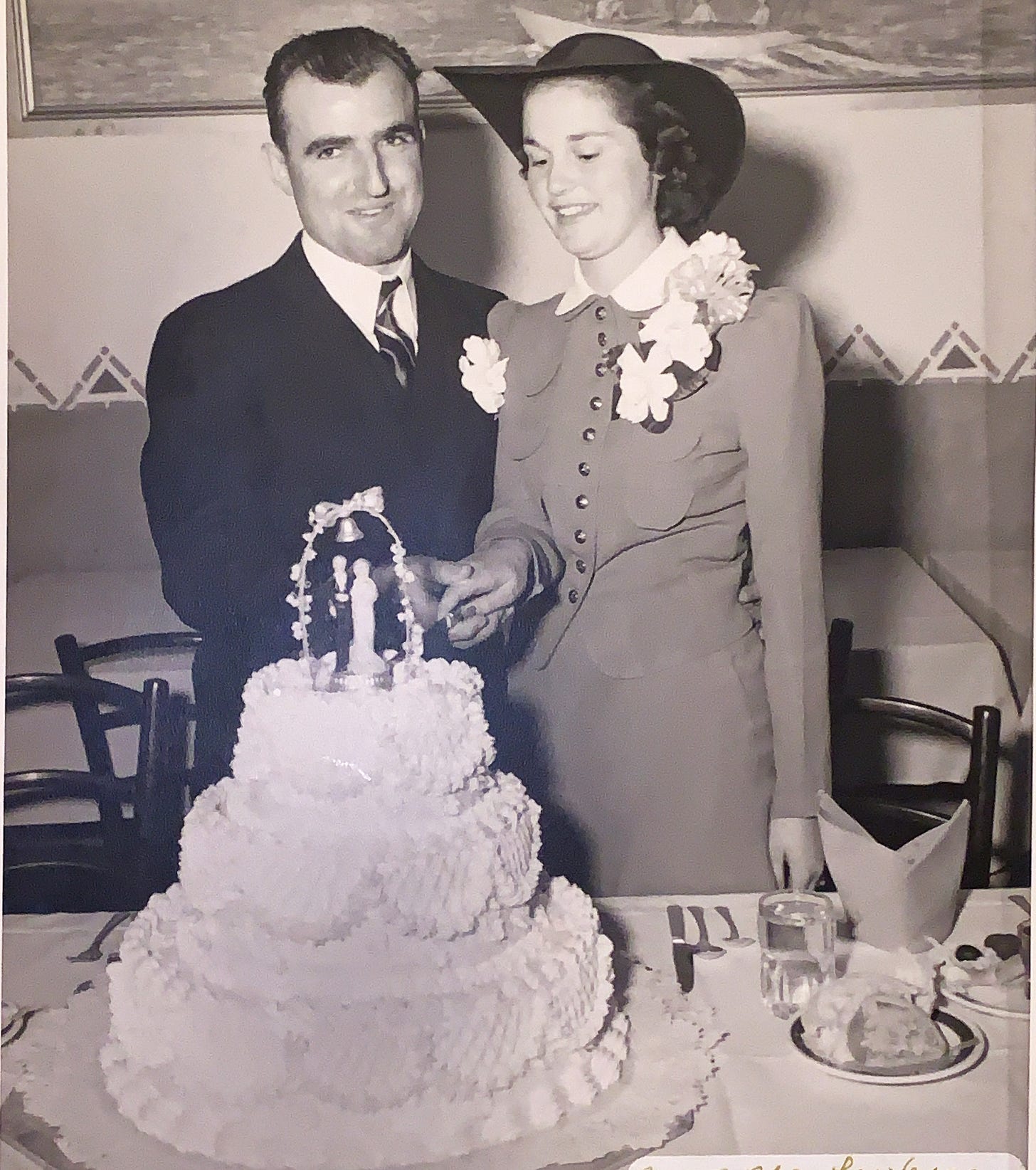Welcome to a newsletter themed at the intersection of longevity and wine history. 🍷
Wedding Day, November 17, 1940
Mario Gemello passed away a month after his 89th birthday in 2005, three weeks before his 65th wedding anniversary to Grandma Kay. One day fifteen years later, she revealed to me unsurprisingly that it didn’t take much for her grief to bubble back up.
“Do you miss Gramps?” she asked me. It was a warm Sunday afternoon in the spring of 2021. We were sitting in the family room of her Los Altos home, where she had lived with my grandfather since the 1970s.
“Do you miss Gramps?” Grandma Kay asked me one day in late spring of 2021.
“Of course I do.”
“Some mornings I have to have a good cry,” she said.
“How often?”
“About once a week. Usually in the morning. Then I say a few prayers. I gather myself. Then I’m good for another week,” she said. “I miss him so much. Everything reminds me of him.
“He can do so much around the house. Now I have to call someone. Never thought I’d last fifteen years without him.”
That’s the extraordinary part of her story. Perhaps even more than Grandma Kay reaching her 100th birthday earlier this year. My grandparents had been married nearly sixty-five years. Their wedding day was in 1940.
But Kay met Mario in grade school, when her family moved from Oakland to Mountain View in 1927. She was six-years-old. Her older brother Pete started class with Mario, and they quickly became best friends.
Years later, Pete became confused when Mario came over to the house — not to see him.
“Wait, what? He’s here to see my sister?”
Mario passed away a month after his 89th birthday on Halloween day in 2005, three weeks before their 65th wedding anniversary. His death preceded a long bout with prostate cancer.
They had a very close marital relationship. So close, in fact, Grandma Kay’s life revolved around him, especially the last few years, when she was ushering him to doctor appointments and cancer treatments.
During that time, many family members suspected that Grandma Kay would be susceptible to the “widowhood effect,” also known as the “broken heart syndrome,” where longtime spouses die close together.
One well-known case in popular culture is Joan Flutie, mother of former NFL quarterback Doug Flutie. She died of a heart attack, less than one hour after her husband, Dick, died, also of a heart attack. Doug's parents had been married for 56 years.1
Another is how the 35-year marriage of country music legends Johnny and June Carter Cash came to a sudden end when June died during heart surgery. Johnny Cash died four months later.
People whose spouses had just died - ending a longterm marriage - have a whopping 66% increased chance of dying within the first three months following their spouse's death, according to a 2014 study published in the Journal of Public Health.
The question, then, is why. In cases like the Fluties’, the quick death immediately following bereavement may be caused by the intense physical ramifications of grief.
So why were we wrong in suspecting Grandma Kay would fall victim to the broken heart syndrome? She’s still powering through fifteen years after my grandfather’s death and occasionally needing to have a “good cry” to start her day. She’s clearly still grieving.
The answer may be found in a 2008 study,2 involving 323,000 married couples, coauthored by Nicholas A. Christakis of Harvard and Felix Elwert of the University of Wisconsin. Their study drew a distinction between spouses who died suddenly and unexpectedly, like from a heart attack, versus those who died of a prolonged health issue, like cancer or Alzheimers. While the former is called the “broken heart syndrome,” partly because the “heart stops,” the latter has been coined “anticipatory grief.”
“The broken heart condition nearly always follows a traumatic emotional loss, such as death of a spouse, parent or child,” said Dr. Barbara Messinger-Rapport Cleveland Clinic geriatric specialist. “It causes chest pain and sudden heart failure, believed to be brought on by a surge of fight or flight hormones.”3
This may be why the “widowhood effect” isn't as often seen among people whose spouses died of diseases, like my grandfather’s prostate cancer.
Christakis’ and Elwart’s study found no increased chance of death in cases, like Parkinson’s or Alzheimers, and only a very slight increased risk in spouses of those who died of certain cancers. In these cases, the grieving spouse had time to prepare for the death, which is why researchers call it anticipatory grief.
The sadness of the loss is just as great, but the shock isn’t so severe.
If you’re new here—hi, I’m Kevin!
I’m the author of 🍷 Rain on the Monte Bello Ridge,🍷 my forthcoming memoir about health, aging and winemaking. (Read the origin story of the book.) 🍇
The Centenarian Playbook is my newsletter, which features:
Healthy aging/longevity tips and stories from Grandma Kay’s long life.
Wine history & stories of the Gemello Winery
Ancestry & family research tips
2008 Study, The Effect of Widowhood on Mortality by the Causes of Death of Both Spouses


